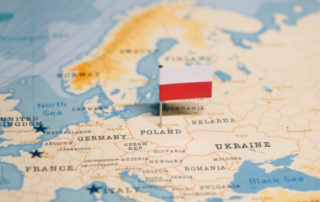
Geopolitical threats affect businesses, organizations, governments, and even individuals around the world. As a business owner, these threats can affect your profits, your reputation, and even your ability to do business in certain countries. If you fail to identify and understand the geopolitical threats that affect your business, you’re likely to end up losing money or even being forced to close your doors.
Let’s take a look at the basic definition of geopolitical threats, some specific types of threats, and examples of each. If you want to know more or would like to work with a professional to understand the geopolitical risks you’re facing, Infortal can assist you. Our team has years of experience in this area. After identifying the threats you’re facing, we’ll help you develop plans to mitigate these risks or avoid them.
Something is defined as a geopolitical risk or threat if it poses a political, military, social, or economic threat to another organization, country, or individual. From a business standpoint, the risk is mainly economic, although reputation damage is also a serious risk in some cases. Some of these threats are ongoing, while others may be situational. Sometimes a geopolitical risk isn’t present in an area until a change in government or the beginning of a conflict in the region. That’s why geopolitical due diligence investigations are so important—Infortal can often bring to light indications of a major shift in power or economic collapse in an area by carefully studying its history and current social conditions.
Here are some types of geopolitical risks:
These geopolitical threats can have serious repercussions for businesses that fail to understand them and what risks they present. Let’s take a closer look at each of these issues and how they can damage your business.
It’s easy to see how war can pose a risk to your business. All we need to do is look at how Russia’s invasion of Ukraine has disrupted much of Europe and even Africa. Companies doing business in Kyiv and other major Ukrainian cities may have lost employees due to either being killed or fleeing the country. Their physical factories and other workspaces may have been destroyed or may no longer be safe to occupy. There may be no customers in Ukraine to purchase your products, or your products could be held up at the port.
Even those businesses that only work with vendors in Ukraine are affected by these issues. With the major ports on the Black Sea. This embargo prevented grain and other materials from being shipped to other countries, including those in Africa that relied on the grain for food. Millions of people suddenly found themselves facing food scarcity, while the companies in Ukraine were unable to do anything with the products and materials they had in storehouses and on ships.
These are just a few of the consequences of the war in Ukraine. Sanctions from the U.S. and Europe have affected thousands of businesses that once purchased or sold items to Russia. McDonald’s, for example, has closed all of its restaurants in Russia, ending their 32 years of operating in the country. If you were doing any business with Russia when the sanctions were put into place, you had to immediately assess all of your dealings to make certain you were following the imposed regulations. If you weren’t, you either had to cease those activities or risk being fined for your violations.
These are just a few of the ways that regional conflicts can threaten your business. Food shortages, global trade disruptions, supply chain disruptions, and other risks all come from wars and can result in businesses struggling or failing. Knowing the indicators of conflict can help you avoid entering into an unstable region.
Not every country wages an overt militaristic war. Some wage economic warfare. This type of war is often more subtle, but it can be just as damaging to countries, businesses, and individuals. It makes use of various methods to weaken the country’s economy and currency. Trade embargoes, tariff discrimination, boycotts, and sanctions can all be forms of economic warfare. To go back to the conflict in Ukraine, the U.S. and other countries have used methods of economic warfare in an attempt to push Russia to halt their invasion. Often, economic warfare is used in this manner to avoid making a conflict larger or leading to another world war.
Economic warfare affects businesses by blocking trade options. If you’re operating in a country that is embargoed or sanctioned, you may not be able to purchase necessary materials or sell your products. You can lose a significant portion of your company’s profits if you had worked with that country for years prior to the start of the economic battle.
On the other hand, sometimes economic warfare fails to achieve its goal. For example, the U.S. trade embargo against Cuba was designed to push Fidel Castro out of power. However, many businesses in Cuba simply turned to trading with Mexico. Trade between the two countries has built up over the years, and by 2014, the trade between the two generated over $370 million for Mexico. Many Mexican business owners have invested in Cuba as well. While U.S. businesses may have suffered from the embargo, those in Mexico saw a new economic opportunity and seized it. This can be an unintended side-effect of economic warfare.
Cyberattacks are a new type of geopolitical threat, but that doesn’t mean they aren’t serious. These forms of attack can quickly cripple a business or a government if the right data is stolen or malware implanted. If your business is hacked and ransomware placed on your network, you may not be able to access anything or make use of any of your IT until it’s removed. Stolen customer data can lead to fines and other penalties if you don’t secure your system correctly, plus it can damage your reputation.
Cyberattacks continue to increase. In 2022, the FBI received more than 800,000 complaints related to cybercrimes. In total, this threat cost over $10 billion in damages, an increase of more than $3 billion over 2021. This doesn’t include hacks that were never reported.
Hacking is often done in conjunction with other forms of warfare. For example, Ukraine’s intelligence agency has reported that state-sanctioned hackers from Russia have attempted to compromise their systems. Cyberattacks can also be done in conjunction with economic warfare, especially against businesses or countries that have invested in cryptocurrency. Even when they aren’t backed by the government, hackers may take it upon themselves to attack those they believe are threats to their country or their way of life.
The final type of geopolitical threat we’re going to look at is resource scarcity. This type of threat may be due to the direct result of a government or other organization, or it may be due to climate change or other environmental factors. For example, a major drought can lead to food scarcity. So can disease. In 2022, nearly 50 million chickens died from the avian flu, leading to a serious egg shortage in the U.S. Eggs tripled or more in price, leaving many on strict budgets unable to afford a food staple that was once only a few dollars.
As mentioned earlier, many countries in Africa have suffered grain shortages due to Russia’s embargo of Ukraine ports. Another result of this conflict is that the U.S. and the E.U. have stopped purchasing oil from Russia. While this was done voluntarily via import bans, it has left many in these countries scrambling to find new providers and oil trading partners. As a beneficial side-effect, however, businesses in the green energy industry have found new opportunities as companies look for new sources of power.
Food, water, oil, coal, and many other types of resources can be scarce. Moving into a region that is experiencing some form of scarcity can be a risk. You may find it difficult to keep your business running, especially if employees are unable to meet their basic needs.
If you don’t know what geopolitical risks you’re facing, you won’t be able to properly make decisions. You could end up moving into a region that is politically unstable. Civil unrest could break out, leading to rioting and looting. Civil war, economic instability, and resource scarcity can leave your business struggling to stay afloat. In some cases, you may even have to cut your loss, losing the thousands or millions of dollars you’ve invested.
Infortal is here to help you avoid these outcomes. We can do a geopolitical risk assessment and deep dive due diligence to help you determine if the country or region you’re moving has been demonstrating factors that indicate a risk. We will provide you with as much information as possible about these potential risks and help you understand the threats you would face if you purchase a business or partner with a vendor in that country. With this information, you can make an informed decision. To learn more, reach out to Infortal today.



